The controller estimates the voltage of a battery automatically and simplifies the process of system setup. Thanks to digital readouts displayed on the controller you will be informed of the battery charging status.
Some consumers claim that the recommended pole diameter is too small for a turbine installation.
If you want to become electricity-independent, this model is just what you need. Whether you live in rural or urban environment, the wind turbine will provide you with the amount of power required to juice up some of your equipment.
600W
12V / 24V
3 blades, Polypropylene and Glass Fiber material
Cut-in wind speed: 4.5 MPH
Rated speed: 31 MPH
- Auto-shutdown system
- Manual shut-off switch
- Charge controller
- Battery voltage auto detect
Length: 2.58 ft
Rotor diameter: 4.33 ft
Weight: 26 lbs
Pole diameter: 1.5"
Wall thickness: 1.9 mm
1 year
11 blades guarantee maximal power output and the hot-dipped galvanized housing ensures protection from corrosion for up to 50 years.
You'll need a rather high tower to affix a wind motor properly.
This wind motor is designed for operation in both flat terrains and highlands with strong winds. Owing to its unrivaled endurance and low-speed operation it generates up to 1600 Watts of electricity. Pretty high rate as for such a small turbine!
1600W
12V
11 blades, Carbon fiber composite
Cut-in wind speed: 6 MPH
Rated speed: 50-60 MPH
- Freedom PMG
- Zinc plated hub
Length: 3.58 ft
Rotor diameter: 5.16 ft
Weight: 52 lbs
Pole diameter: 1.5"
Pole height: 40-80 ft
Amazon's 30-day return policy
Hybrid controller simplifies the connection and operation. The solar panel generates electricity in calm weather when the wind generator is off.
The installation manual is a bit unclear.
This easy-to-install small-sized wind engine shows high productivity and excellent efficiency. It is ideal for powering a camp, RV, or your cottage house.
500W:
400W - wind turbine
100W - solar panel
12V / 24V - wind turbine
12V - solar panel
3 blades, Carbon fiber composite
Cut-in wind speed: 5.6 MPH
Rated speed: 24.5 MPH
Max wind speed: 78.3 MPH
- Solar panel
- Hybrid charge controller
- Battery voltage auto detect
Rotor diameter: 3.93 ft
Weight: 17.64 lbs
Pole diameter: 2"
Pole height: 15-33 ft
1 year
Owing to a pretty small swept area the turbine doesn't require as much space for installation as other models. Fins on the housing efficiently carry the heat away from the alternator.
The housing is not coated with paint thus it may corrode easily if installed near the ocean.
This wind generator is a good choice for powering a boat, an RV, or a small meteorological station as well as for supplying electricity to an outdoor lighting system or smart sprinklers.
400W
12V
6 blades, Glass-fiber reinforced polypropylene
Cut-in wind speed: 4.7 MPH
Rated speed: 28 MPH
Max wind speed: 89.5 MPH
- Auto-shutdown system
- Charge controller
Rotor diameter: 3.67 ft
Weight: ~22 lbs
Pole diameter: 2"
Pole height: 15 ft and higher
1 year
Large swept area of the rotor is meant to transfer more kinetic energy to a shaft and thus guarantees maximum power output.
The wires brought out from the alternator are of the same color making the controller connection a bit complicated.
If you are looking for an inexpensive wind generator to carry out our DIY projects off-grid we recommend you to consider this model.
420W
12V
3 blades, Fiberglass
Cut-in wind speed: 4.5 MPH
Rated speed: 17.9 MPH
Max wind speed: 78.3 MPH
- Electromagnetic brake
Rotor diameter: 7.3 ft
Weight: ~20 lbs
Pole diameter: 2"
Pole height: 25 ft and higher
1 year
This site is a free online resource that strives to offer helpful content and comparison features to its visitors. Please be advised that the operator of this site accepts advertising compensation from certain companies that appear on the site, and such compensation impacts the location and order in which the companies (and/or their products) are presented, and in some cases may also impact the scoring that is assigned to them. The scoring that appears on this site is determined by the site operator in its sole discretion, and should NOT be relied upon for accuracy purposes. In fact, Company/product listings on this page DO NOT imply endorsement by the site operator. Except as expressly set forth in our Terms of Use, all representations and warranties regarding the information presented on this page are disclaimed. The information which appears on this site is subject to change at any time. More info
Windmill DA-600 600W
Seawater Proof
The Windmill DA-600 is a relatively small-sized yet powerful turbine. Moreover, this model is virtually the best in its class when it comes to wattage, as it is designed with a 12V and 24V system. Equipped with 3 blades made of sturdy materials, this horizontal wind generator is capable of withstanding high winds without any damage to the whole construction. As for the housing, it is made of high-quality plastic and is coated with a special sealing that protects the turbine from UV lights, rain, and other elements. The Windmill DA-600 will definitely serve you for years to come.
This model weighs only 26 pounds yet it can easily fight off sudden blasts. Such sturdiness is achieved owing to the turbine's well-thought aerodynamic design as well as to high-quality materials used in its manufacturing. Recommended wind speed for this model is 30 mph; at this speed, the turbine generates up to 600 Watts of energy. However, the windmill also works at lower wind speeds. The tests show that the turbine sets in motion at the minimal cut-in wind speed of 4.5 mph and is capable of generating up to 100 Watts of energy when a wind speed reaches 12 mph.
To sum up, the Windmill DA-600 is ideal for installation at the locations with moderate winds or coastal regions as the housing is seawater proof and will neither rust nor go out of order in case of salt water ingestion.
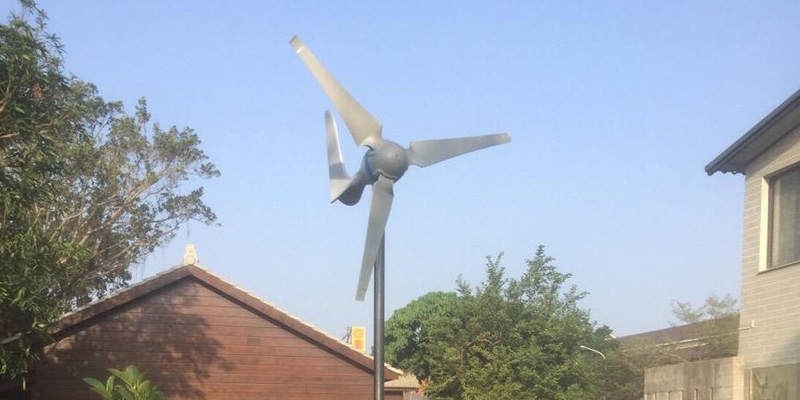
Professional Quality
The windmill comes with a reliable charge controller, a device designed to estimate the battery voltage automatically and change its settings according to the specifications. What's more, the controller operates an inbuilt brake magnet activated when the wind is too strong or when the battery is fully charged. Also, you can shut off the Windmill DA-600 manually.
Additionally, the controller provides you with digital readouts of the mode the system works in at the moment. As you may see, the model offers professional quality, however, it won't completely free you from the grid. This wind generator is an entry level model, a supplement to your power needs. For this very reason, we recommend combining this device with another alternative energy source like solar panels to use the turbine efficiency to the hilt.
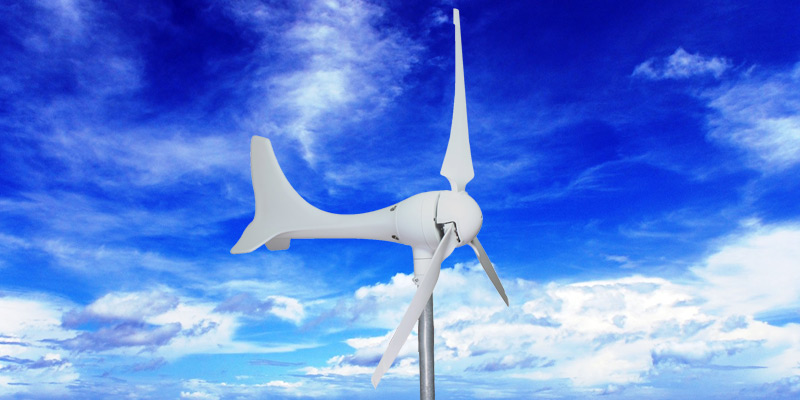
Installation
When mounting the turbine you should conform to several important specifications. Primarily, the device should be mounted on a 1½" pole with a wall thickness of 1/10" to hold the turbine securely in place against high winds. Next, please keep in mind that the blades span is 4.3 feet, thus it is important to install the turbine in a place where the blades won't get stuck in tree branches or power cables. Finally, the turbine should be located above upwind from buildings and trees as well as above any wind barriers to ensure maximum efficiency. Generally, the optimal height required for this windmill is 20 feet and up.
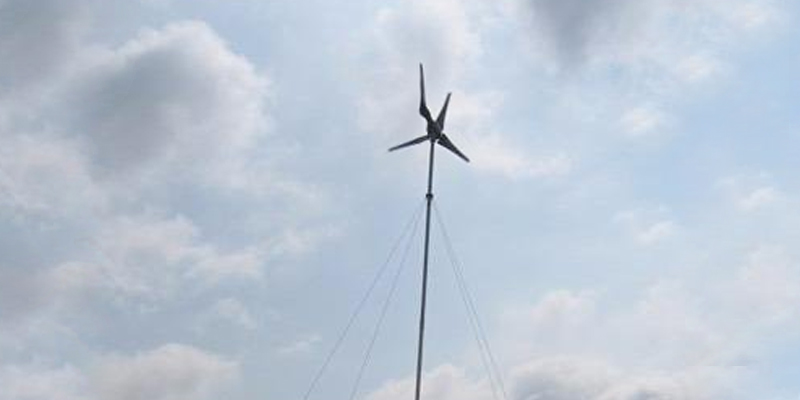
Electric Power Generation Against Wind Speed
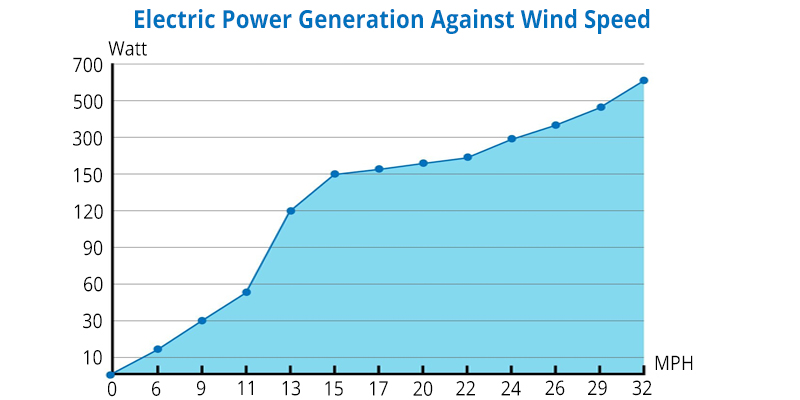
| Last updated price | $549.95 |
| Stock | In stock |
| ASIN | B01HGJH4O2 |
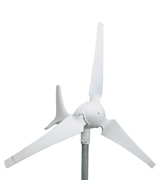
Missouri Raider 1600W 11-Blade
Withstands Even Abrupt Winds
Missouri Raider is a quite powerful turbine that works efficiently even in heavy winds and generates energy with a jaw-dropping power output of 1600 Watts. The manufacturer states the max speed this wind turbine can withstand may be up to 125 mph while the cut-in speed is just 6 mph. This machine is really efficient, no doubt! So, what is the secret of such unrivaled yield?
First off, the Missouri Raider model is designed with 11 blades that entrap even the slightest blasts of the wind for the best output. The blades are made of carbon fiber composite that makes them incredibly solid yet flexible enough to withstand high winds and cope with the assigned task perfectly. The Generation 4 Raptor blades mounted on this windmill are the newest innovation in the world of wind turbines. Being aerodynamically tapered, they guarantee top-notch efficiency in energy delivery and, what's more important, the blades self-adjust their speed under strong winds. This way, the possibility of breaking virtually comes to naught and the life span of the whole unit is extended.
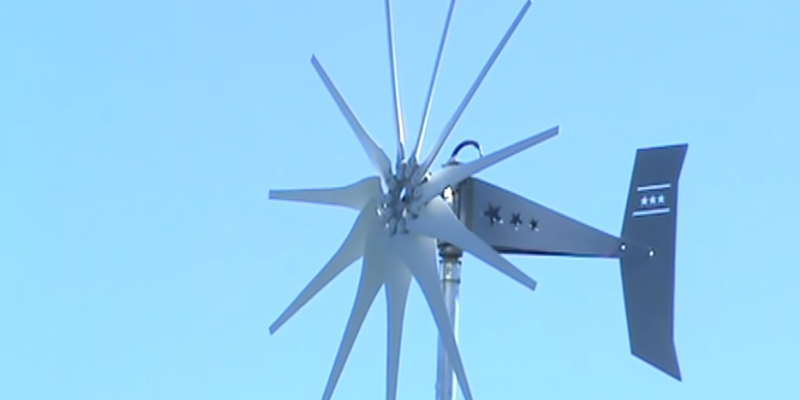
The Most Advanced Generator
To convert wind into electric energy, the turbine uses the modern Freedom PMG generator that provides easier and smoother shaft rotation compared to other alternators available on the market. It also withstands higher loads. Such characteristics are achieved thanks to the implementation of 2 sleeve-type bearings, one on each side of the generator. The polished aluminum housing encloses the stator winding ensuring proper centering of all the internal parts against each other. But the main feature that stands this generator apart from the competitors is the amount of copper! The Freedom PMG has twice as much copper as any other alternators, and the more copper, the more power; it's that simple. Just imagine, at 266 rpm the alternator produces enough power to charge a battery, and it generates up to 4 times more energy when it reaches the speed of 960 rpm. Amazing! All in all, we find this wind turbine ideal for home use.
By the way, if you've got a windmill equipped with a Delco-type alternator and you are not satisfied with its power output you can freely replace it with the Freedom PMG. This model is designed specifically for wind turbines and fits Delco bolt patterns 100%.
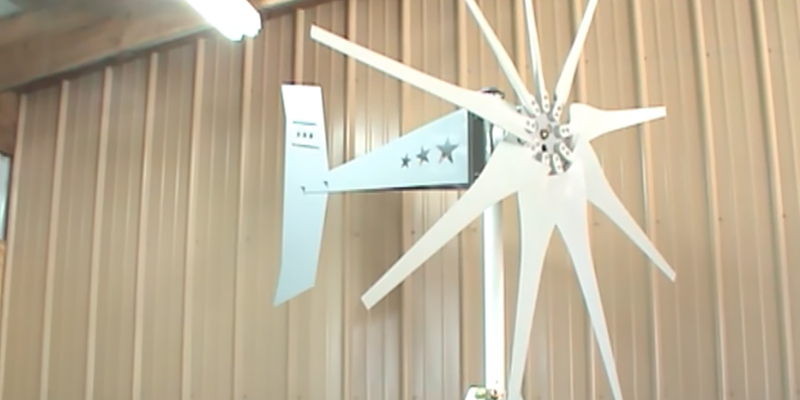
50 Years of Quality
The manufacturer has thought this wind turbine through to the last detail. This model is not only highly efficient and reliable but also quite durable. To specify, the housing of the windmill is completely divisible, you can replace any of the onboard details that wear off. This is really crucial since, in contrast with one-piece models, here you won't need to buy a whole new wind turbine.
You also don't need to be a tech-savvy to assemble the whole construction, it will take you 30 minutes at most to accomplish the task. It is recommended to mount the turbine on a 1½" pole with the height of 40 feet or more, so you will probably need some assistance. Finally, the hot dipped galvanized housing is weatherproof and corrosion-resistant, you won't need to renew the coating for up to 50 years, it will not rust. Hence, having installed the Missouri Raider Wind Turbine you won't need to worry about its maintenance for many years.
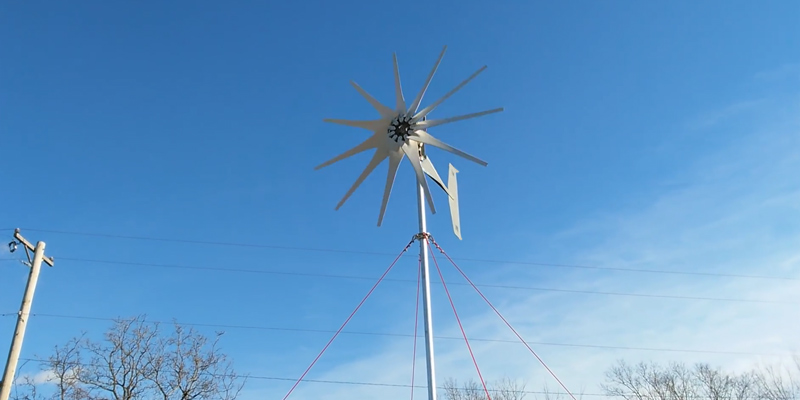
Electric Power Generation Against Wind Speed
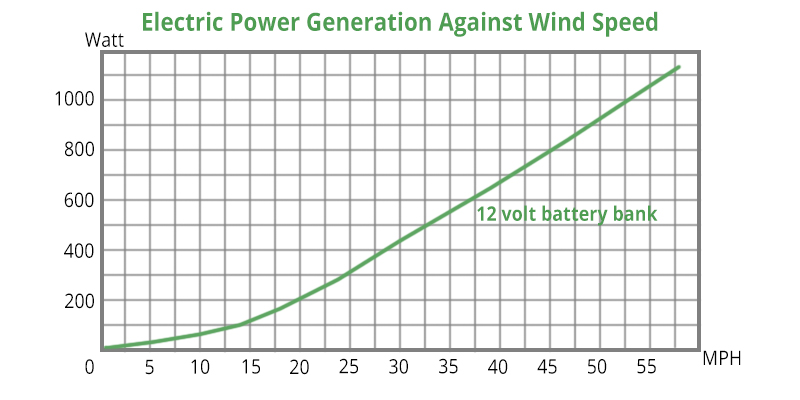
| Last updated price | $0.00 |
| Stock | May be out of stock |
| ASIN | B00O28QIUW |
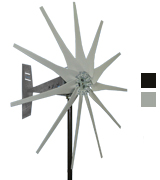
ECO-WORTHY 400W
All-in-one Solution
The set supplied by Eco-Worthy is the genius solution for anyone as it is capable of generating green energy in any weather conditions. The system includes a wind generator and a solar panel for maximal efficiency and also features a charge controller. So, when it's dark outside or the sky is overcast the accumulators are charged by the wind turbine and during sunny days the solar panel produces energy.
Let's take a closer look at the wind generator first. The housing and the tail fin are both made of a solid cast aluminum sheet that guarantees excellent weatherproof properties and also carries the heat away from the alternator inside. What's more, the device is also resistant to salt corrosion and humidity, hence, those who live at the seaside will have no worries that it may be damaged by habitat conditions. As for the alternator, it is equipped with high-efficiency neodymium magnets that decrease the torque of the generator up to 0.08N.M. As a result, the windmill starts up at the minimal cut-in wind speed of 5.6 mph and is capable of generating up to 400 Watts of energy when the wind speed reaches 24.5 mph. Summing up, the model is ideal for generating off-grid power for a small house or a camp.
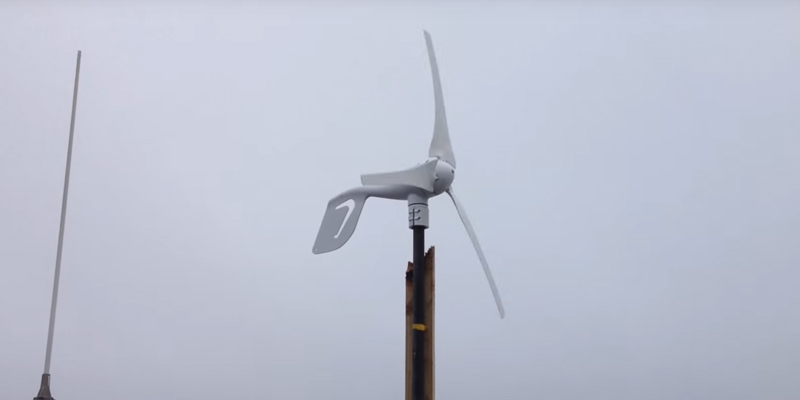
How to Generate Power in Calm Weather
The solar panel by Eco Worthy is made of polycrystalline plates that offer the efficiency of over 17%. The index might not be the highest possible but it is, in fact, quite satisfactory. The panel frame is made of anodized aluminum that provides structural strength and doesn't add much to the weight. The front panel is constructed of low-iron high transparency tempered glass. Both these materials provide excellent protection from different environmental conditions. By the way, the solar panel is certified to correspond to the IP65 standard of protection against dust and water, meaning you can utilize the system in different climatic zones inside the US.
With the dimensions of 26.16" x 39.3" x 1.37", the solar panel can be easily mounted using standard clamps. As for the specifications, this module features 100 Watts output while daily yield may reach 500 Watts depending on the weather. This would be enough to charge the battery in calm weather.
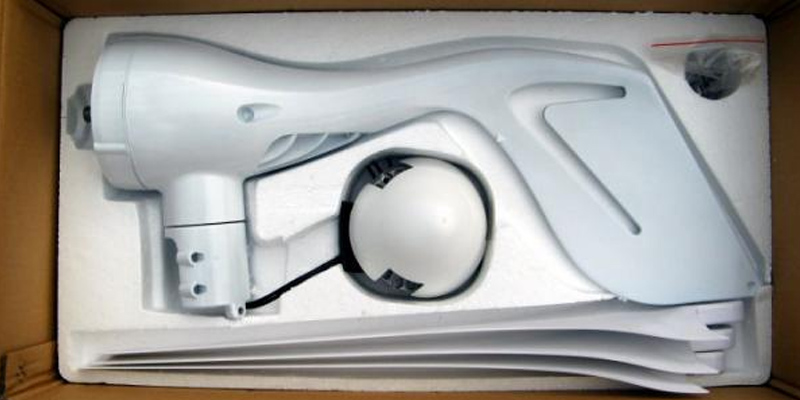
A Hybrid Controller
Noteworthy, the included charge controller system uses 2 different sources of energy and, therefore, generates 2 various kinds of electrical power. It seems clear that the manufacturer should have included 2 controllers for each accumulator. However, the engineers from Eco-Worth have seen about the set's peculiarity and equipped it with a hybrid controller. The controller can convert the three-phase alternating current produced by the wind generator and manage the direct current the solar panel collects. By the way, this engineering decision has also simplified the connection and operation principle of the whole system as well as reduced its overall size.
As we've mentioned above, the Eco-Worth system is IP67 rated and is, consequently, protected against dust and water, so you can install it outside fearlessly. The hybrid controller works with both 12 Volts and 24 Volts batteries; it also features discharge and overcharge protection prolonging battery lifespan dramatically.
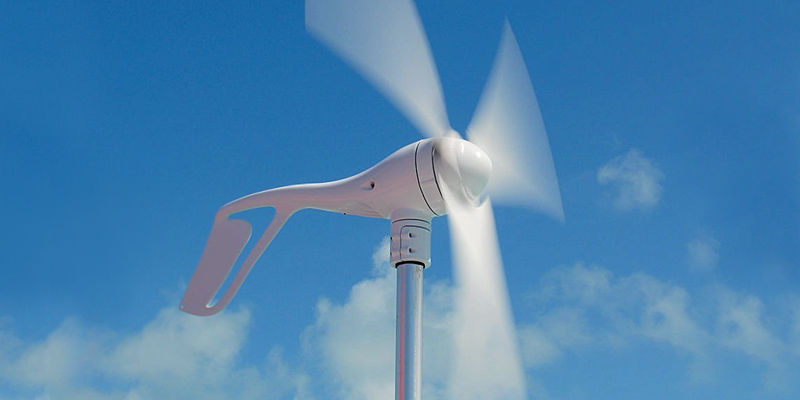
Electric Power Generation Against Wind Speed
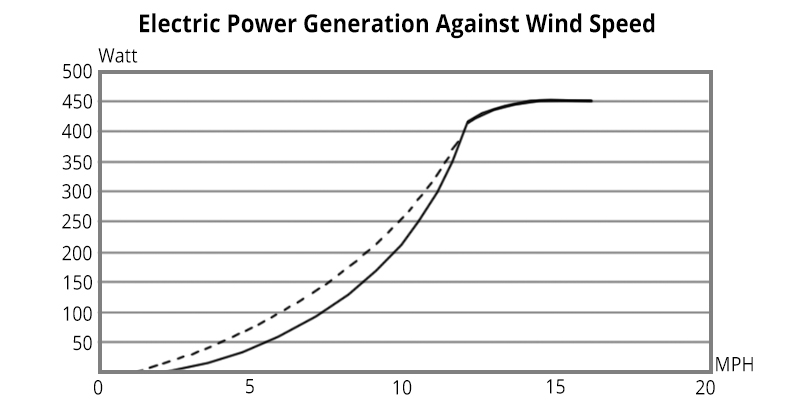
Additional Info
| Last updated price | $485.99 |
| Stock | In stock |
| ASIN | B00ZECMODU |
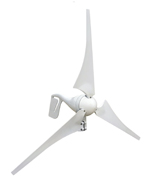
GudCraft WG400X
Stable Operation at Low Speeds
This small wind turbine from GudCraft is suitable for locations with moderate and strong winds. Designed with 6 blades, the WG400X starts generating 3-phase alternating current at 4.7 mph wind speed and it works steadily at stronger winds, its cut-out speed is 90 mph. Characteristics like that are pretty impressive for an entry-level model. We should also mention that this turbine rotates slower at high winds compared to 3-blade models thereby reducing the possibility of damaging the blades and prolonging the windmill service life. As for the turbine capacity, the manufacturer states that the max power output here is 400 Watts at 33.5 mph wind speed. However, the tests show that its nominal output is just 200–250 Watts at 28–28 mph while the stated max yield hasn't been reached, unfortunately. Still, the GudCraft WG400X will provide you with approximately 1500–2000 Watts of energy per day, that's enough to fully charge 2 batteries 100 Amps each. This windmill would suffice for powering residential smart sprinklers, charging some battery-powered equipment, and supplying small meteorological station with electricity.
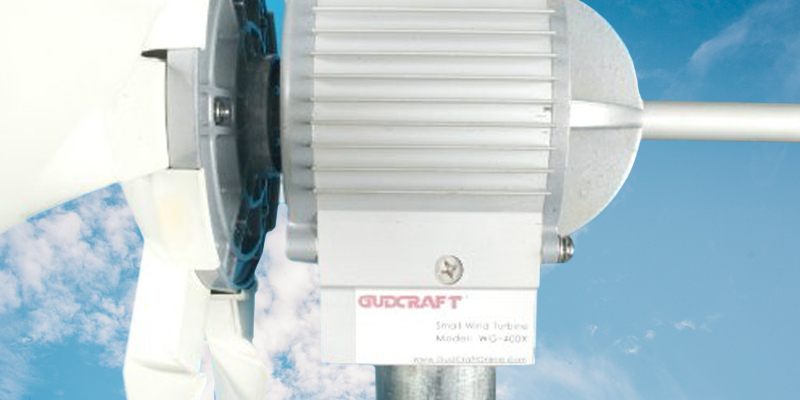
Improved Structural Integrity of the Housing
The manufacturer has improved the WG400X and eliminated the defects found in the legacy wind generators. The earlier versions of this model were equipped with a dump load resistor that was meant to dump excess energy generated by an alternator and, thus, protect it from breaking. That resistor was installed in a tailpiece of a turbine and was connected to the main circuit board via 2 wires outside the housing. The problem was that those wires were not hermetically sealed and water drops were running down the wires inside the housing when it was raining. As a result, the machine was easily damaged. Now, the manufacturer dropped the resistor from the scheme so the new WG400X wind turbine has fully enclosed and thus weatherproof housing. As for the excessive energy removal, this option was abandoned in favor of a brake magnet that shuts down the turbine if the battery is fully charged.
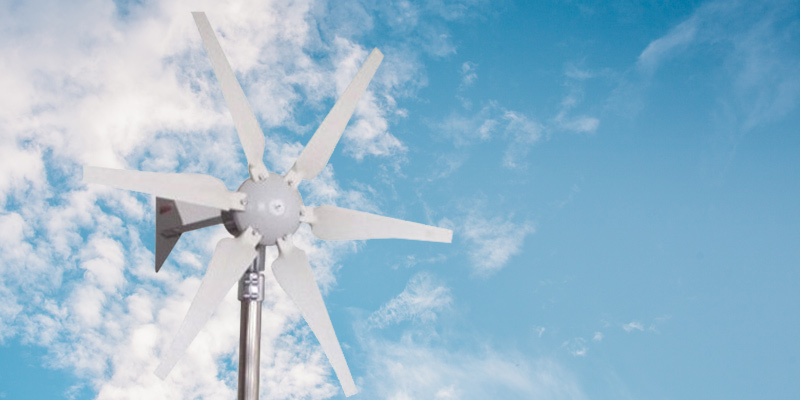
Save on Wires
A charge controller enclosed in housing was another significant construction deficiency of the previous wind generators. A charge controller converts energy produced by a wind turbine into the direct current the batteries are charged with. If a windmill is installed far from the batteries a considerable amount of expensive cable should be run between them. Moreover, the direct current is known to lose its energy while flowing down the wires, so the larger the distance between a charge controller and the battery the bigger the energy loss. That's why GudCraft engineers have designed the WG400X model with the external charge controller that can be mounted close to the battery ensuring minimal energy loss while the wind generator can be installed at a considerable distance. Additionally, the charge controller drives the brake magnet to shut the turbine down in the case of high wind or when the batteries are fully charged.
As you may see, the manufacturer really cares about its customers and tends to fix all the weak points to provide convenient utilization of the wind turbine.
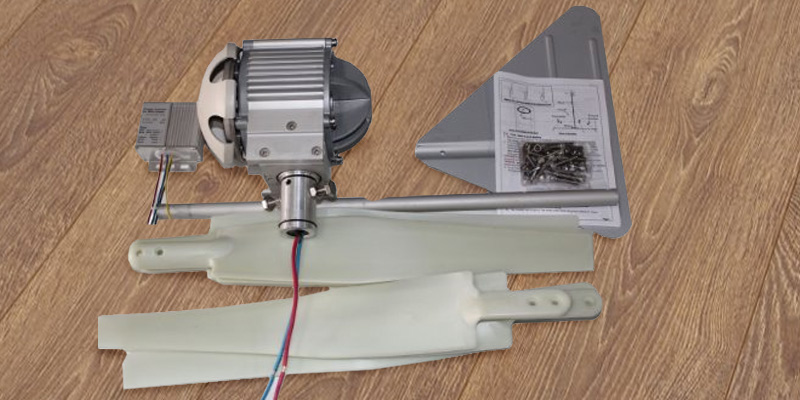
Electric Power Generation Against Wind Speed
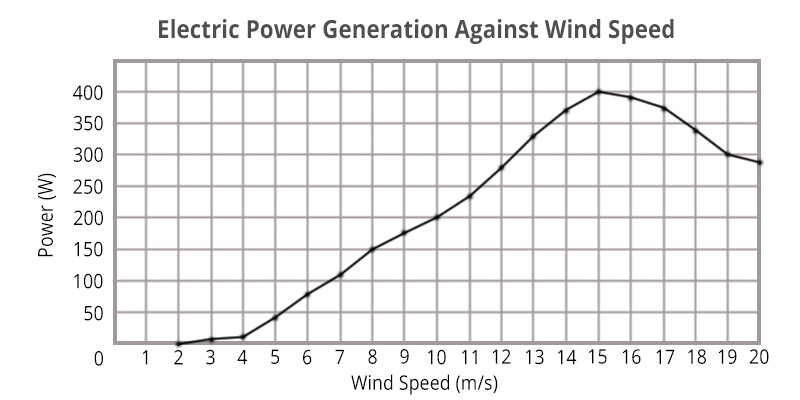
Additional Info
| Last updated price | $0.00 |
| Stock | May be out of stock |
| ASIN | B004Z8IQF4 |
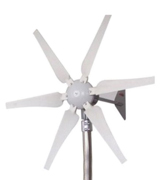
ALEKO WM 450
The First DIY Project
In search of the best wind turbines, we have come across one interesting model from the Aleko company. The WM450 is not as powerful as the manufacturer claims and doesn't yield the stated 450 Watts. To tell the truth, the windmill generates 360 Watts of electricity at the wind speed of 31 mph. However, what has caught our interest here is the affordable price of the machine. This model would come in handy for those new to green energy generation and those who don't want or need a windmill that will cost them an arm and a leg. For example, consumers looking for a wind turbine to power equipment for some off-grid DIY projects will definitely appreciate WM450.
The Aleko WM450 starts up at the wind speed of 4.5 mph whereas the rated operation speed for the battery to start charging ranges between 6.7 mph and 44.8 mph. Additionally, the wind generator is equipped with a brake magnet that stops the machine at the trip speed of 78 mph and thus protects the blades from breaking down.
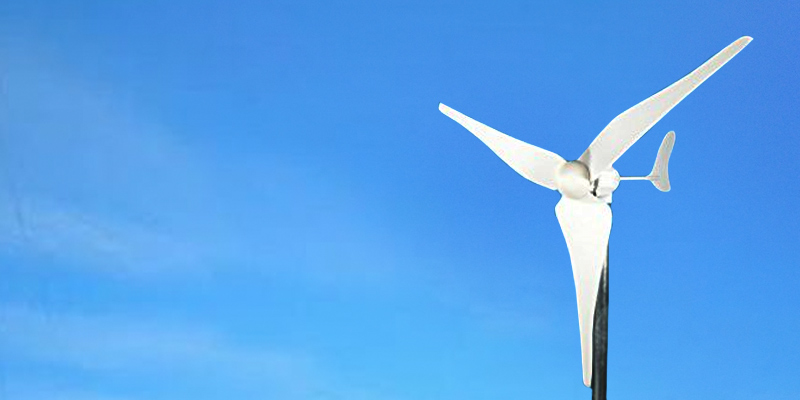
Few Words About Design
This wind generator is pretty conventional when it comes to the assembly of components. Long blades here guarantee efficient transfer of kinetic energy to turn a low-speed shaft connected to the alternator. However, the longer the blades are the larger the swept area is. It means that the wind turbine requires a lot of space for safe operation, therefore, it's not recommended to mount it on a roof or a short pole.
The turbine housing is made of aluminum and is coated with paint. This guarantees unrivaled weatherproof qualities and doesn't add to the overall weight of the unit in contrast with steel models. The slip rings are located inside the housing and the wires are brought out at the center of the axis bearing so you can easily run a wire through a pole the windmill will be mounted on. This way, you will protect the cable from outside impacts. And don't worry about wires getting tangled, the wind usually blows from 2 main directions only and it is virtually impossible to tangle a wire. Finally, to make the rotor turn to face the wind, there is a yaw bearing that allows a wind generator to track the wind direction while the tail fin directs the rotor into the wind.
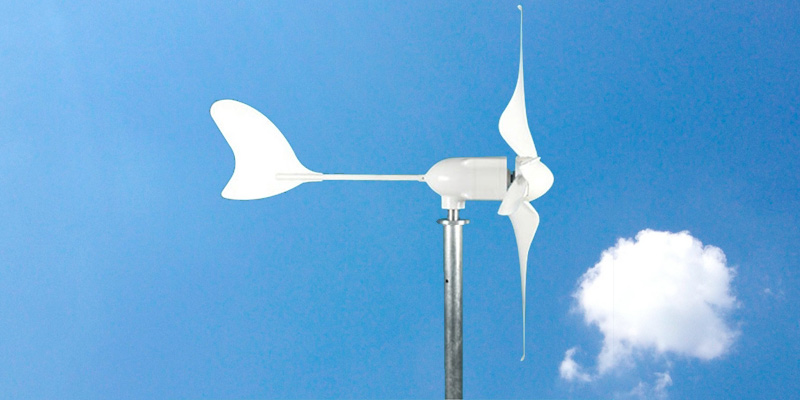
Installation
If you are going to install the windmill alone without any professional supervision remember several important factors that will help you with the task.
1. Find the best location for the windmill installation. It should adhere to several parameters:
- Nothing should interfere with wind-stream (buildings, trees, etc.);
- Make sure that the wind engine doesn't bother your neighbors;
- Avoid installing the turbine near power cables as the blades can get stuck and/or damage the cables;
- To avoid interference, it is not recommended to mount the wind motor close to antennas.
2. Select a pole of the appropriate height. Consider the weight of the windmill and its type of installation. Generally, the turbines are installed on poles from 2" to 4" in diameter.
3. Pour a cement foundation for the wind engine to stand steady even under high loads. Minimal requirements for the foundation ask for 2 feet deep 5 x 5 feet square area. It would suffice for a pole of 25 feet in height. If you need a higher tower pour a larger foundation and reinforce the pole with tension wires.
4. Finally, you will need a lifting equipment to install the engine on a pole.
If you have necessary skills and are confident that you can handle this task on your own you are free to install the wind generator without expert assistance. If not, it is better to engage a specialist.
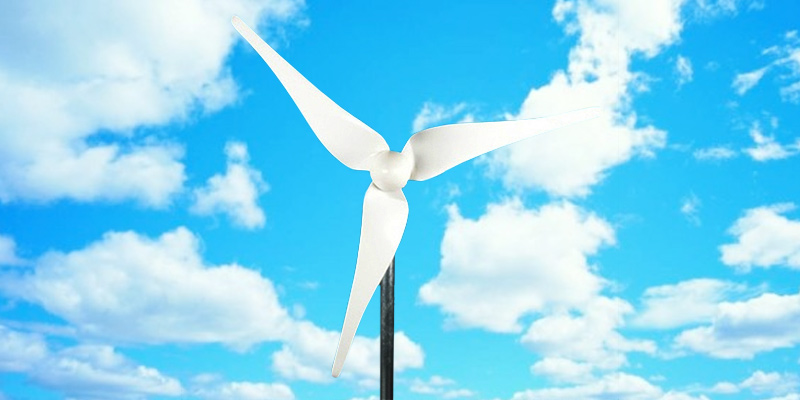
Electric Power Generation Against Wind Speed
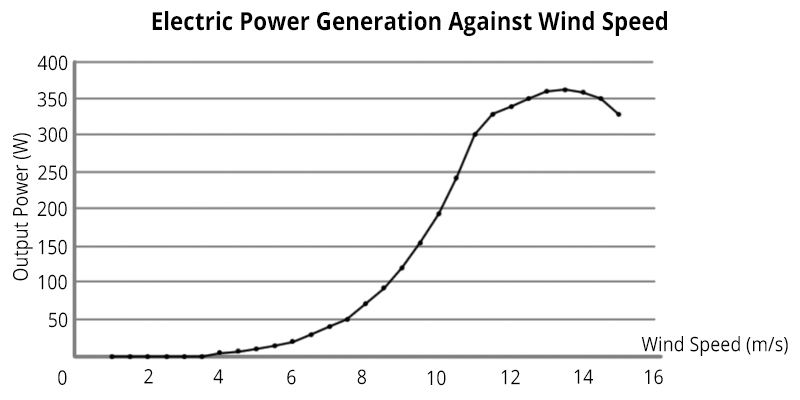
Additional Info
| Last updated price | $0.00 |
| Stock | May be out of stock |
| ASIN | B0076FXB8K |
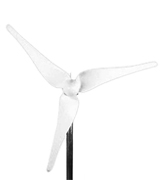
What is a Wind Turbine
Nowadays, more and more people follow the green stream and start using alternative energy sources in order to save our planet from ecological disaster. Consequently, people become energy independent and save many dwindling natural resources like water, coal, oil fuel, etc. As we all know, the wind is an increasingly important source of renewable energy that replenishes constantly, so wind generators are used to derive electricity from the power of wind. Here everything is simple since wind turbines resemble a windmill's operation principle. They are equipped with rotors to revolve electric generators that produce electricity by converting the wind's kinetic energy into electrical power. So, the higher the wind speed is, the more electricity the wind turbine produces. To help you choose the right wind-electric system for residential use we've picked 5 best models available on the market.
Sunlight is another renewable source of energy that may be of interest to you. We recommend you to read our review on solar panels that can completely replace grid power supply and solar charge controllers that ensure correct operation of those panels.
What Features to Compare
You should take into account a number of factors when deciding to install a wind turbine system. First of all, check your local zoning codes to be sure that you're allowed to install a wind turbine on your property. Second, your home should have at least 1 acre of property for wind turbine installation since even the smallest models require a considerable amount of space.
If you are certain that your property is appropriate for a wind turbine, the first thing to consider is the power output of a wind generator and the amount of electricity you require. If you need a wind turbine to illuminate your yard when it is dark or power a smart sprinkler, a wind turbine system of 200-300 Watts would suffice. In case you already have solar batteries on your property and want to have auxiliary energy source, opt for a wind turbine with 400-800 Watts output. But if you want a significant amount of energy to power a small house or a number of appliances in it, a system with more than 1,000 Watts yield is the only option for you.
Next thing to consider is the wind power at your location. To learn the average wind speed, call your local weather station or airport or check this information on the United States Department of Energy website. Keep in mind that the higher the wind speed is the more blades a wind turbine should have. To specify, if there are only several blades on a turbine they turn really fast in high winds and thus are prone to fast wear as well as for wasting wind energy. So, if you leave in the area with high speeds opt for a wind turbine designed with a greater number of blades that move slowly and offer the highest efficiency possible.
It is also important to choose a wind generator with a charge controller since the turbines mostly generate three-phase alternating current that should be converted into direct current. On top of it, these controllers divide energy between the batteries to charge them equally and efficiently. Additionally, most modern wind generators are designed with a brake magnet that shuts down the turbine in case of overloads, too high winds or when a battery is fully charged. Thus, the brake prolongs the operational life of the whole unit drastically.
Finally, don't forget that the dimensions of a wind turbine and its installation type are also crucial since these features let a consumer choose the right pole to affix a turbine and find the best place for its mounting.
FAQ:
Q: What environmental benefits does wind power bring?
A: Wind energy doesn't emit any toxic substances, doesn't pollute the air or water, and creates no waste. It means that the wind turbines operation trigger no cancer, respiratory or heart diseases. Additionally, wind farms use less water to generate electricity in contrast with nuclear power plants. So, wind power preserves our health and doesn't deplete our natural resources.
Q: How efficient are wind turbines?
A: The majority of wind turbines generate electricity 70-85% of the time with varied output power (since this figure depends on a wind speed). The scientists have calculated that these machines are capable of generating up to 24% of the maximal yield a year while the power stations output equals 50-80% a year. So it is obvious that wind motors are rather efficient on top of being environmentally friendly.
Q: What is a wind turbine made of?
A: Generally, the blades are made of fiberglass, wood-epoxy, or reinforced polyester. Additionally, the blades have a matte finish to reduce reflected light. As for the housing, the most widespread material for it is aluminum.
Q: What is a lifespan of a turbine?
A: On the average, wind motors carry on producing electricity for approximately 20-25 years.
Q: Can I put a turbine on the roof of my house?
A: Yes, you can, if a swept area allows. However, it is preferable to install the wind engine on a pole in order to avoid vibration produced by a turbine that might be too noisy and cause structural problems for your house.
Q: Are wind turbines noisy?
A: Early-model wind generators are much noisier compared to modern ones. The manufacturers have reduced the noise of mechanical components in the latest equipment and the only noise you will probably hear while a turbine works is some light swishing sound produced by blades interacting with the wind. So, modern windmills are quiet.
Q: How fast do the blades turn?
A: This varies from model to model since the speed of the blades depends on both their number and the wind speed. Additionally, some machines operate at variable speed. Generally, this figure is somewhere between 15-20 rpm.
Q: What is the difference between large and small turbines?
A: Small turbines are suitable for powering a number of battery-operated equipment or supplying electricity to a building supplemented by the grid. Large turbines generate electricity to power a grid itself. So the main difference between these 2 types of turbines is their max power output.
Sources:
1. Melanie J. Martin How to Choose a Wind Turbine, SFGate.
2. Installing and Maintaining Small Wind Electric System, Energy.gov.
3. Home Wind Turbines, Which?
4. Electricity Generation Using Small Wind Turbines at Your Home or Farm, Omafra.gov.
5. How Do Wind Turbine works, Energy.gov.
6. Wind Turbine, Wikipedia.


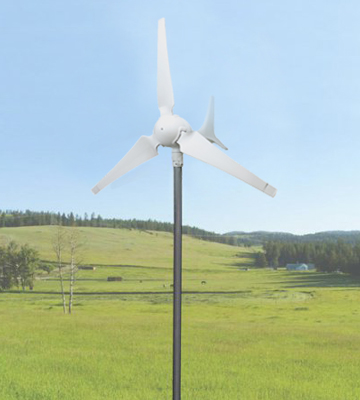
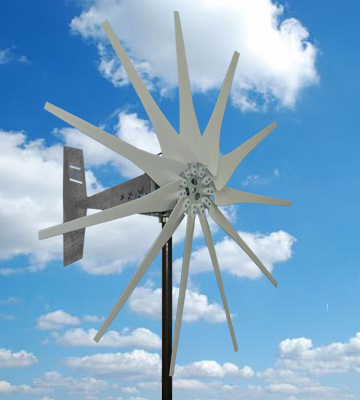
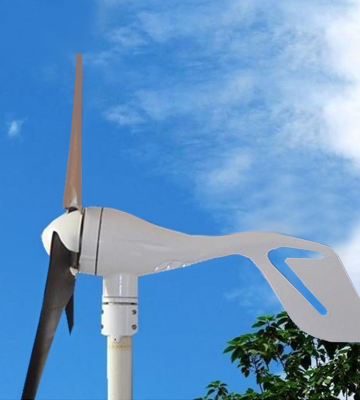
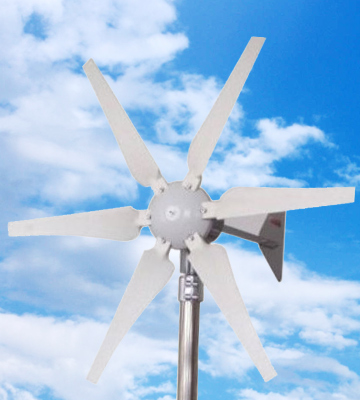
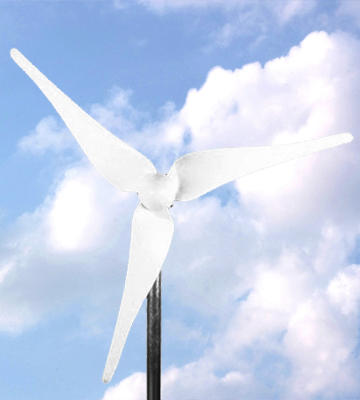

Your comment was successfully sent
Error! Please try again later